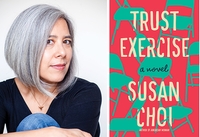The Patty Hearst kidnapping was one of the defining incidents of the 1970s, but almost 30 years later, it has faded into legend, despite the many words written on the subject. Choi (The Foreign Student) makes the first stab at fictionalizing the drama, giving it grainy psychological depth and texture, while cleaving close to the true course of events. Instead of focusing on Patty (here named Pauline, the daughter of a wealthy newspaper publisher), Choi turns her attention on Jenny Shimada, a young Japanese-American woman, who, fleeing the Feds after she and her boyfriend orchestrate the bombing of draft offices to protest the Vietnam War, agrees to help Pauline and her kidnappers. This protagonist is based on a real-life person, Wendy Yoshimura, who spent what's now called "the lost year" (1974, when Patty and her captors disappeared) with Patty and two of her kidnappers. In Choi's book, the four spend the time in a rented farmhouse in New York State, with Jenny running errands while Pauline and her "comrades" undergo physical training for their fight against "the pigs" and halfheartedly write a book. While the unfolding drama—Pauline's transformation, the bank robbery, Pauline and Jenny's cross-country trip—is enthralling, it is Choi's skill at getting inside the heads of her protagonists that gives the novel its particular, unsettling appeal. What makes Jenny a radical? And what then leads her to wonder whether "perhaps they had been wrong to fight Power on its terms, instead of rejecting its terms utterly"? Sounding the depths of her conflicted protagonists, Choi takes an uncompromising look at issues of race, class, war and peace. Agent, Bill Clegg. (Sept. 5)
Forecast:HarperCollins plans a seven-city author tour, ads in the
New Yorker and an NPR campaign. A reading group guide and blurbs from Joan Didion and Jhumpa Lahiri may draw in women readers, and the book's unusual hook could help it get coverage in both the mainstream and alternative press.


